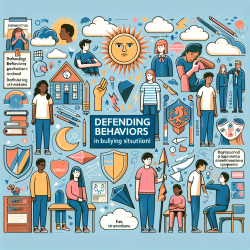The intricate dynamics of bullying in schools often involve not just the bully and the victim but also bystanders and defenders. Recent research by Wu et al. (2016) explores the role of defending behaviors in bullying scenarios and their associations with mental health among junior high school students. This study provides invaluable insights for practitioners aiming to enhance their intervention strategies and support student well-being.
The Role of Defending Behaviors
Defending behaviors refer to actions taken by individuals to intervene or stop bullying incidents. These behaviors can be exhibited not only by bystanders but also by victims and bullies themselves. The study found that victims tend to report higher defending behavior scores compared to bullies and bystanders. This suggests that victims might possess a heightened sense of empathy and anti-bullying sentiment, motivating them to act against bullying.
Mental Health Implications
While defending behaviors can be beneficial in reducing bullying incidents, they are also associated with mental health challenges such as social anxiety and depressive symptoms. The study highlights that defending behaviors are positively correlated with these mental health issues, particularly among victims and bystanders. This underscores the need for practitioners to address the psychological impact on students who take on defending roles.
Strategies for Practitioners
- Create a Supportive Environment: Encourage a school culture where defending behaviors are supported and valued. This can help reduce the social isolation and peer pressure often experienced by defenders.
- Develop Empathy-Based Programs: Implement programs that foster empathy among students. Understanding the emotional experiences of others can motivate students to engage in positive defending behaviors.
- Address Mental Health Concerns: Provide access to counseling services for students exhibiting defending behaviors. Early intervention can mitigate the risk of developing anxiety or depression.
- Encourage Peer Support: Facilitate peer support groups where students can share their experiences and strategies for dealing with bullying.
Encouraging Further Research
The findings from Wu et al.'s study open avenues for further research into the nuanced relationships between defending behaviors, bullying roles, and mental health outcomes. Practitioners are encouraged to explore these dynamics within their own educational settings to tailor interventions effectively.
To read the original research paper, please follow this link: Defending behaviors, bullying roles, and their associations with mental health in junior high school students: a population-based study.










